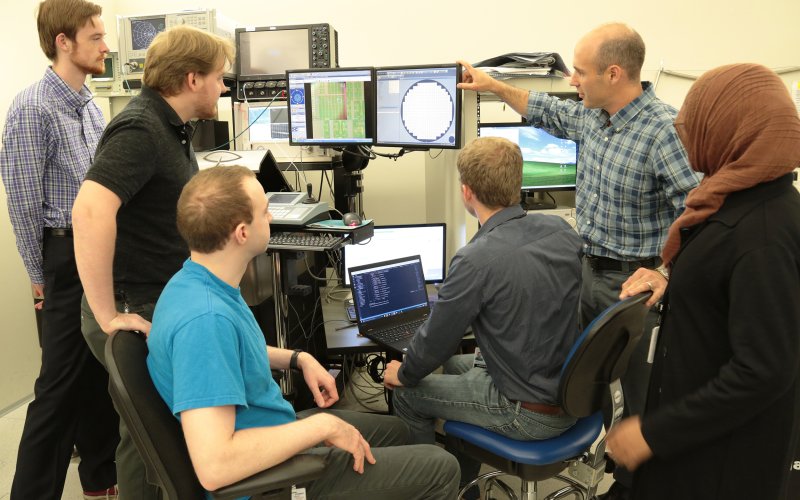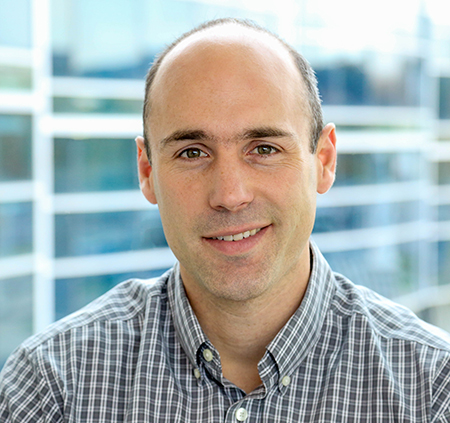Q&A With CNSE’s Nate Cady: Why Everyone is Talking About Semiconductors

ALBANY, N.Y. (Jan. 29, 2024) — Nathaniel Cady has witnessed the evolution of the UAlbany’s College of Nanotechnology, Science, and Engineering almost from the beginning. Joining UAlbany in 2006, Cady holds a PhD in microbiology from Cornell University and specializes in research at the interface of nanotechnology and biology. He currently serves as both CNSE’s associate dean for research and professor of nanoscale science and engineering.
His research uses inspiration from natural, biological systems to guide the design, formulation and fabrication of unique systems and technologies. Some of his core research areas include the development of technologies that assist with diagnosing disease and nanoscale electronic devices called “memristors” that mimic the function of neuronal synapses, critical connection points in the brain.
As the executive director of the SUNY Applied Materials Research Institute (SAMRI), Cady is responsible for building the strategic alliance between the State University of New York and Applied Materials, Inc., which serves as the nucleus of research and development activities on advanced materials, devices, manufacturing, and emerging areas of science and technology.
Cady is also leading UAlbany’s contribution to the Northeast Regional Defense Technology Hub, or NORDTECH, a $40 million consortium of universities, defense, and semiconductor manufacturing powerhouses announced in September as part of the Microelectronics Commons. The Microelectronics Commons was established under the landmark 2022 CHIPS and Science Act to help seed research and development in the semiconductor industry and accelerate the path of discoveries from labs to industrial production facilities.

NORDTECH’s founding members are UAlbany, NY CREATES, Cornell, Rensselaer Polytechnic Institute and IBM.
We caught up with Cady to discuss why everyone is talking about semiconductors.
Q: What is nanotechnology and why is it so important?
Nanotechnology is the field of science and engineering that focuses on studying and manipulating matter at the nanometer length scale (that is, one billionth of a meter and smaller). At this scale, we work with individual atoms and molecules, as well as very thin layers of materials or small clusters of atoms and molecules.
Materials behave differently at this size, and we can utilize these fundamental material properties to devise new technologies, such as new types of electrical devices, or even incredibly small or sensitive tools to measure physical, chemical and biological phenomena. For example, many materials become more chemically reactive, or respond differently to light and electricity when they are reduced to nanometer size. Nanoscale materials and technologies are also finding their way into everyday products and medical devices, often making those products better.
Q: You come from a background in microbiology. How does this guide your current research?
Biology all starts at the molecular level, which is the “nano” size scale. I am able to use my fundamental understanding of how systems work at the molecular scale and apply that knowledge to the development of new technologies. For my work on biological sensors and diagnostics, I can directly use my background in microbiology to design new ways of detecting viruses and bacteria, or the immune response that a person develops after infection.
In my work on electronics, I am able to translate my understanding of biological processes, such as how nerve impulses travel through the brain, to inspire new types of electrical devices.
Q: What is NORDTECH and what role does UAlbany and the College of Nanotechnology, Science, and Engineering play in it?
NORDTECH is one of the eight hubs within the newly created Microelectronics Commons. The Department of Defense established the Microelectronics Commons to enable fast-track electronics prototyping and development in the United States. The ultimate goal is to transition early stage technologies from the “lab” or initial demonstration phase to testable prototypes that can be transitioned to manufacturing.
UAlbany and CNSE are central players in the NORDTECH hub and will leverage the nanofabrication facilities within CNSE and at NY CREATES’ Albany NanoTech Complex to enable lab-to-fabrication prototyping and development. As part of the first-year funding for the hub, UAlbany has received funding for new nanofabrication equipment for the Innovation Lab within CNSE, as well as funds to support engineering and workforce development staff. The Innovation Lab is CNSE’s laboratory facility that is used for building new devices and structures at the nanometer and micrometer level.
Q: In 2022, UAlbany launched the AI Plus initiative to integrate teaching and learning about AI across the University. Where do you see the future of nanotechnology research going, and what role will artificial intelligence play in it?
Nanotechnology research will continue to leverage fundamental work across multiple fields, including engineering, physics, chemistry, mathematics, biology, and computer science. Research in nanotechnology continues to result in new discoveries about how materials behave at very small size scale, and how we can translate that unique behavior into useful technologies.
AI has already enabled scientists and engineers to better understand complex data, make accurate predictions about new materials and devices, and solve complex problems. I predict that AI will continue to play a strong role in enabling all forms of research and development activities and will be especially important in nanotechnology research.
Q: You serve as associate dean for research, a professor, you lead a research lab, and you also serve as executive director for SAMRI. When you’re not wearing any of your numerous hats at UAlbany, what’s something you do for fun?
I’m originally from Vermont and love the outdoors. In my spare time I spend a lot of time camping, fishing, hiking, biking, boating, and skiing with my wife and two kids. I’m also a foodie and love to bake homemade bread and to come up with tasty meals on the grill and in the kitchen. As for my favorite/best recipe, locally sourced braised venison shanks are top of my list right now.




